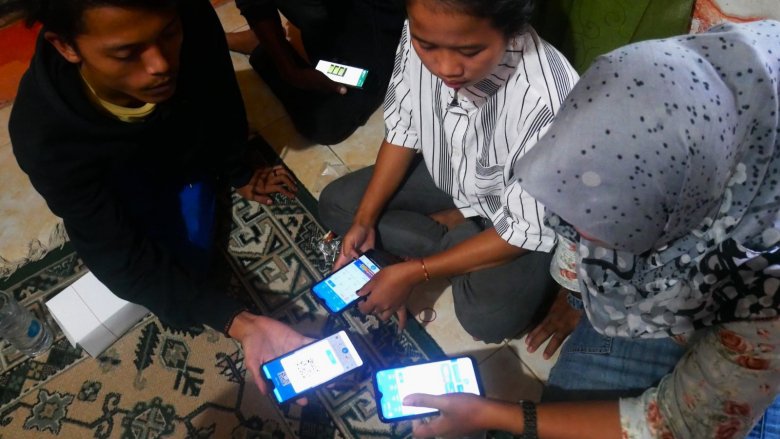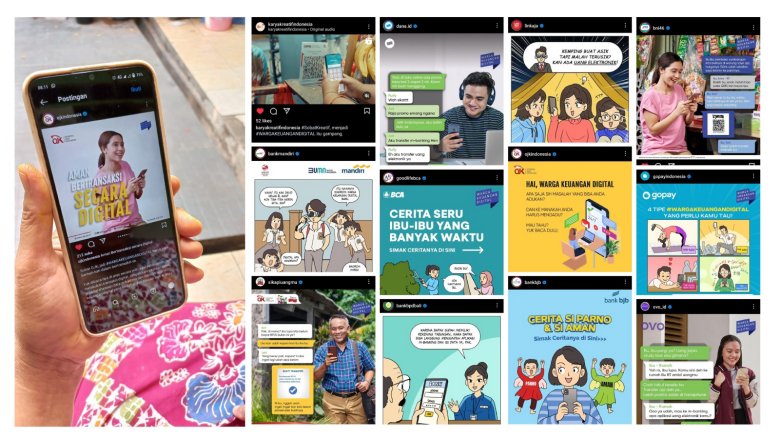Ismail is a fish trader in the Berau district in Eastern Kalimantan and a typical small entrepreneur. He needs cash to buy fish from local fisherfolk and for other transactions. But not only is cash hard to get in the rural area where he lives, carrying cash is a security risk, and dealing in such small amounts is a laborious bookkeeping chore.
However, once Ismail began participating in the World Bank’s supported Financial Inclusion Pilot project, he learned that he could start making payments through mobile phone, and that fisherfolk he did business with could too.
“If using cash transactions, the business records and the actual cash flows often don't match,” said Ismail, who also owns a fishing equipment shop. “After starting to use e-money, my business transactions are recorded properly, and I can also monitor them from my mobile phone. It is convenient for my business.”
Moving away from cash-based transactions: Progress and challenges
Ismail's story illustrates how financial technology applied to financial services is gaining acceptance and having an impact in Indonesia. Bank account ownership in Indonesia has increased from 20% in 2011 to 52% in 2021, according to the World Bank’s Global Findex Database 2021. Mobile money account ownership has also grown significantly, rising from about 815,000 users to 18.8 million between 2014 and 2021. In addition, around 75 million Indonesians made a payment through mobile phones in 2021, 33 million more than in 2014.
Affordable financial services, including access to bank accounts and mobile money, can help reduce poverty and strengthen economic growth and resilience. Basic financial services can help small businesses and women increase their incomes and open the door to greater opportunities.
Despite the promise of these innovative financial services, a lack of trust remains a significant hurdle for many in adopting them. Concerns about online security and data breaches worry potential users. Many people are unaware of how these payment transactions work, reflected in relatively low financial and digital literacy index rates of 49.6% and 41.5% respectively.
To overcome these challenges, the World Bank has supported several financial literacy initiatives such as the Greenback 2.0 project in 2018, which promoted efficiency in the remittance market. In 2019, the World Bank provided support for the Financial Inclusion Pilot project, which aimed to increase ownership and use of formal financial services and to harness the use of technology applied to financial services.
To build on these efforts, Indonesia’s Central Bank (Bank Indonesia) and Financial Services Authority (OJK) launched two Digital Financial Services (DFS) learning “modules” to provide instruction about innovative financial product and services options for individuals and small and medium-sized enterprises (SMEs). The modules were to be used as a social media campaign to reach individuals and as a lesson plan for training courses for small and medium-sized businesses. They were created with support from the World Bank and the Swiss State Secretariat for Economic Affairs (SECO) and were introduced in August 2023 during the Digital Financial Inclusion Festival.
Community learns about mobile banking and e-money as part of the activities supported by the financial inclusion pilot project.
The training module for SMEs expands existing training frameworks offered by Bank Indonesia. It provides guidance on ways digital financial services can help small-medium companies grow, with advice on how to open a bank account, explanations of digital payments, and information on building business online. The training breaks down suggestions for different moments in the growth phases of small businesses.
The module for individuals is aimed at promoting digital financial services for both non- users and “passive users,” individuals who have mobile banking app or electronic money account but seldom use them. During a three-month pilot conducted in collaboration with banks and e-money providers, informational materials were disseminated across social media platforms including Facebook, Instagram, and WhatsApp groups. Following this pilot and focus group discussions, the module is now being put to use by regulators (Bank Indonesia and OJK) and by the industry (banks and e-money providers).
Edison, a teacher and a part-time photographer, is one of the participants in the pilot project. Despite having e-money and a mobile-banking app, he rarely used them due to security concerns. He now realizes that digital financial services are reliable.


